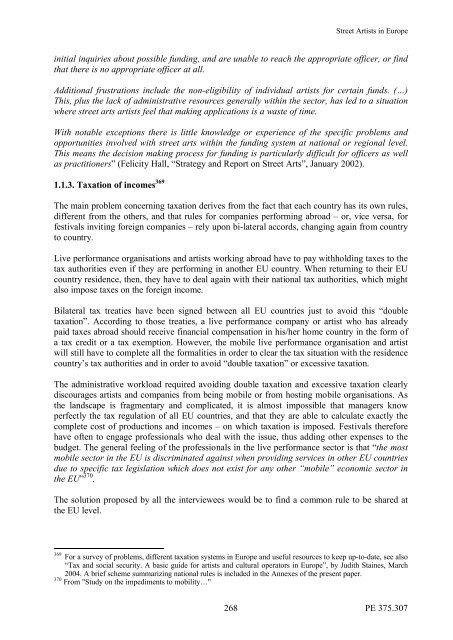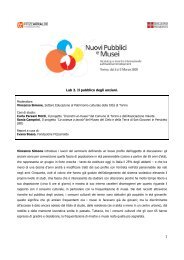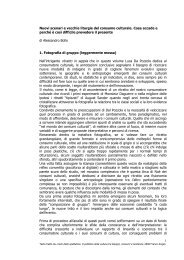STREET ARTISTS IN EUROPE - Fondazione Fitzcarraldo
STREET ARTISTS IN EUROPE - Fondazione Fitzcarraldo
STREET ARTISTS IN EUROPE - Fondazione Fitzcarraldo
Create successful ePaper yourself
Turn your PDF publications into a flip-book with our unique Google optimized e-Paper software.
Street Artists in Europe<br />
initial inquiries about possible funding, and are unable to reach the appropriate officer, or find<br />
that there is no appropriate officer at all.<br />
Additional frustrations include the non-eligibility of individual artists for certain funds. (…)<br />
This, plus the lack of administrative resources generally within the sector, has led to a situation<br />
where street arts artists feel that making applications is a waste of time.<br />
With notable exceptions there is little knowledge or experience of the specific problems and<br />
opportunities involved with street arts within the funding system at national or regional level.<br />
This means the decision making process for funding is particularly difficult for officers as well<br />
as practitioners” (Felicity Hall, “Strategy and Report on Street Arts”, January 2002).<br />
1.1.3. Taxation of incomes 369<br />
The main problem concerning taxation derives from the fact that each country has its own rules,<br />
different from the others, and that rules for companies performing abroad – or, vice versa, for<br />
festivals inviting foreign companies – rely upon bi-lateral accords, changing again from country<br />
to country.<br />
Live performance organisations and artists working abroad have to pay withholding taxes to the<br />
tax authorities even if they are performing in another EU country. When returning to their EU<br />
country residence, then, they have to deal again with their national tax authorities, which might<br />
also impose taxes on the foreign income.<br />
Bilateral tax treaties have been signed between all EU countries just to avoid this “double<br />
taxation”. According to those treaties, a live performance company or artist who has already<br />
paid taxes abroad should receive financial compensation in his/her home country in the form of<br />
a tax credit or a tax exemption. However, the mobile live performance organisation and artist<br />
will still have to complete all the formalities in order to clear the tax situation with the residence<br />
country’s tax authorities and in order to avoid “double taxation” or excessive taxation.<br />
The administrative workload required avoiding double taxation and excessive taxation clearly<br />
discourages artists and companies from being mobile or from hosting mobile organisations. As<br />
the landscape is fragmentary and complicated, it is almost impossible that managers know<br />
perfectly the tax regulation of all EU countries, and that they are able to calculate exactly the<br />
complete cost of productions and incomes – on which taxation is imposed. Festivals therefore<br />
have often to engage professionals who deal with the issue, thus adding other expenses to the<br />
budget. The general feeling of the professionals in the live performance sector is that “the most<br />
mobile sector in the EU is discriminated against when providing services in other EU countries<br />
due to specific tax legislation which does not exist for any other “mobile” economic sector in<br />
the EU” 370 .<br />
The solution proposed by all the interviewees would be to find a common rule to be shared at<br />
the EU level.<br />
369 For a survey of problems, different taxation systems in Europe and useful resources to keep up-to-date, see also<br />
“Tax and social security. A basic guide for artists and cultural operators in Europe”, by Judith Staines, March<br />
2004. A brief scheme summarizing national rules is included in the Annexes of the present paper.<br />
370 From "Study on the impediments to mobility…"<br />
268<br />
PE 375.307






